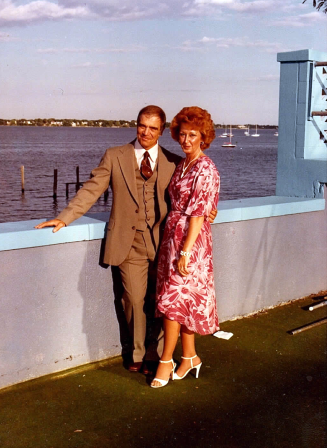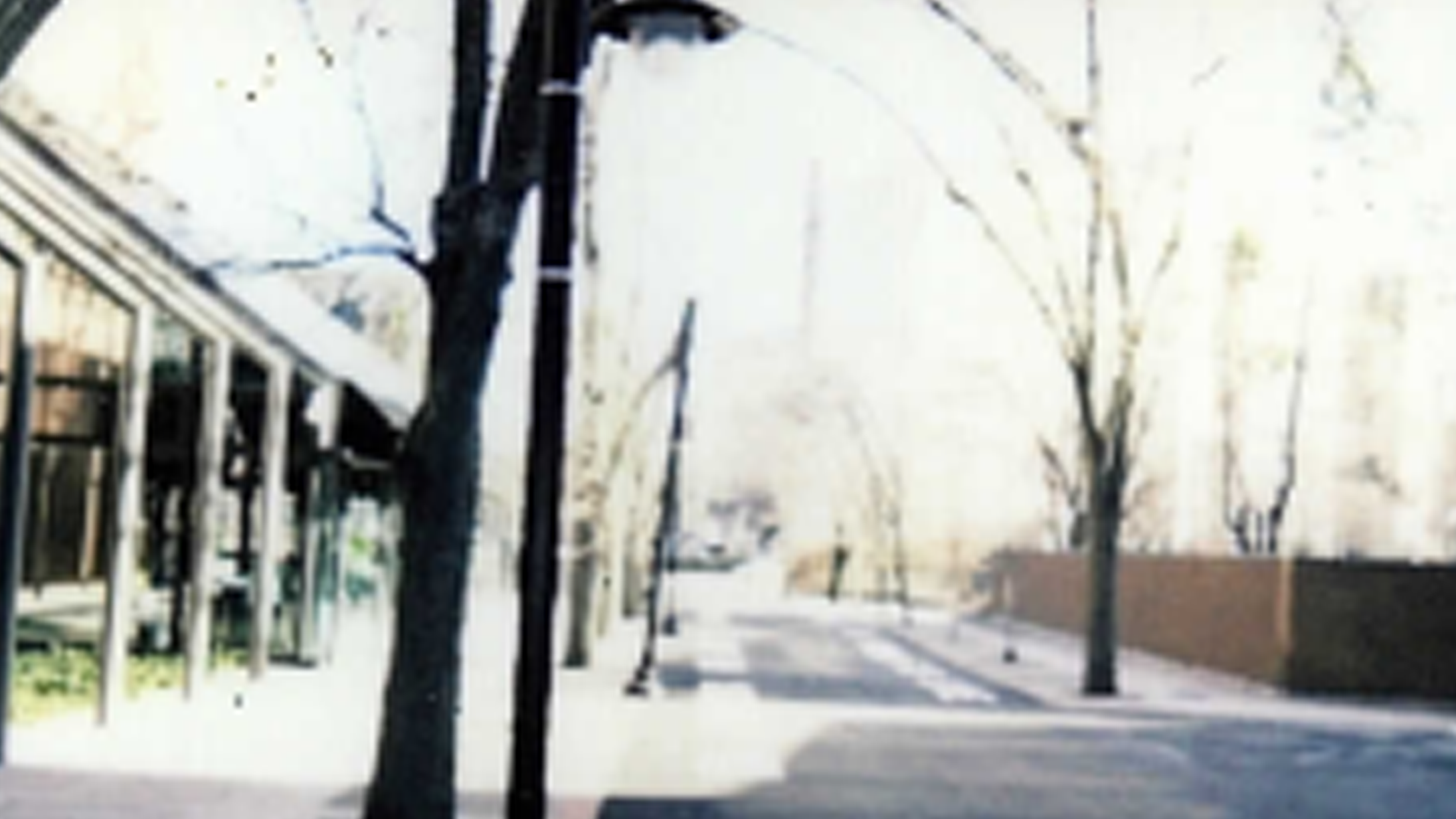Luigi Sammartino arrived at his death on March 5th, 1921, “by reason of being struck by an auto,” as the unidentified coroner claimed. Before it could be removed from the street, a second car crushed Luigi’s body. The coroner absolved the second driver of blame. But the driver of the first machine, the ostensible death machine (a Ford), “instead of stopping proceeded…at such a rate of speed that it was impossible for the witnesses…to identify him in any way.” The coroner here seemed to rely on the testimony of witnesses, the same witnesses who, perhaps either inattentive or indifferent, had failed to move the body of Luigi Sammartino out of the way of the second car. Throughout the coroner’s report the last name of my great-great-grandfather is misspelled: Samartino—one silent “m” short.
My grandfather ventured an explanation as to why Luigi was out that night in Providence, Rhode Island, when the auto struck: “He was out looking for broads.” He told me that Luigi, his grandfather, the first of his family to emigrate to America, was “quite the ladies’ man, so I heard,” with a wife and son in Italy—and yet here, in Providence, both working, and looking for broads. I asked my grandfather what Luigi was like, but he said that his father, Rocco, never mentioned him. My grandfather thought he had learned about Luigi from his cousin Louie—and then he reminded me that Louie is dead. Or maybe it had been his cousin Eddie, my grandfather wondered, before reminding me that Eddie, too, is dead.
“So I guess to answer your question, I don’t know.”
My grandfather, who has been married to my grandmother for more than sixty years, found the coroner’s report of Luigi Sammartino in a drawer in his house and can’t recall how it got there, but thought I should know of its existence. I love my grandfather, but I have no idea why he wanted me, out of all of the people in the family, to know about Luigi. Now that I do know, there’s the issue of what to think. I think history is not identical to parable. I think fate is not a gene one inherits. I also think I know nothing, and, regardless of what is true or likely or possible, I often fear I will die a death more absurd than that of my great-great-grandfather, that Luigi’s death somehow foreshadows my own.
In the coroner’s report the only instance of a first person pronoun appears in the same sentence as a typo—that is: “From careful review of the testimony and an investigation of all the cirsumstances [sic] surrounding the fatality, I certify…”
I embrace the mystery of family, its comedic awe, and yet remain desperate for patterns, structures, deep insidious forms, a reason for caution at all crosswalks.
Around where Weybosset becomes Broad Street, on Jackson Walkway, near the Cathedral of Saints Peter & Paul, the Roman Catholic Diocese of Providence, and Gilbane Building Inc.—where, on a Saturday night ninety-nine years ago, crowds would have filled the now-barren space around long-gone shops—here, as the report specifies, “it appears that the deceased was crossing Weybosset Street from the Cathedral side so called towards Westminster Street in company with Luigi Del Maro and just as the deceased was about to step on to the curb stone a Ford machine came along…”
Since the report does not acknowledge the coincidence of both men being named Luigi, one might assume this to have been unremarkable, common. And while there is no other mention of Luigi Del Maro in the report, one can only imagine what he thought of on future nights when he encountered a set of headlights. Maybe, for instance, Del Maro saw his proximity to Sammartino’s fate as evidence of his own family’s good luck. Or maybe, instead, the fate of Sammartino forever evoked in Del Maro a prevailing sense of doom.
The narrow Jackson Walkway, formerly Jackson Street—down which the guilty Ford driver became “lost to view”—has a quiet cobbled appearance, tree-lined, and often puddles after rain, the tall brick columns of the church offering the path and courtyard ample jagged shade.
The “Ford machine” could have easily been a Model T, the first car produced, marketed, and priced for the masses; the car which, in the year 1920, violently clattered off those promising Michigan assembly lines more than one million times; the car which, priced between $400-$700 (depending on whether the Touring, the Sedan, the Coupe, or the Roadster), appeared obtainable to both the lonely employed, and the anxious patriarch; the same car which, boasting a four-cylinder engine, reached a not insubstantial forty-five miles per hour.
One imagines a state of affairs in which the accidental killer of Luigi idly scanned the newspaper pages, and was struck by the Model T ad (“The Universal Car.”) Taken by the sense of power, intention, control. (Was he a veteran of WWI, seeking escape velocity from the accidents of a former life?) He’s holding his wool trilby in both hands when he stands at last beside the Model T, thinking of the spring air hard against his face.
Perhaps the accidental killer had thought the vehicle resembled a horse and buggy: the cabin—square, narrow, slant-windowed—welded to a wheeled sleigh, the horse replaced by a hood, a long container of deliberate metal.
Once, dropping me off at Providence’s Kennedy Plaza for the Peter Pan bus, not far from Cathedral Square, my grandfather accidentally switched to the wrong side of the road: thinking the street one-way, he changed lanes, but because it was not one-way, a RIPTA bus plowed toward us. My grandfather slowed down, honked. I told him he was on the wrong side of the road. He yelled at the bus to get out of his way. My grandfather drives a Nissan Rogue.
Is it possible, one wonders, that Luigi did not have a mustache? Also, why were the contents of his pockets not enumerated? Does the proper name “Providence,” as the philosophers believe, truly only mean its referent? Why were only these three words misspelled: “circumstances,” “machine,” and “Sammartino”? (Bonus: what does it mean that “Sammartino” was misspelled three times?) What, exactly, did Luigi look for in a broad? And was “about 7:45 o’clock in the evening,” as it says in the report, really the ideal hour to meet broads in 1921? (It seems too close to dinner, but maybe Luigi ate early?) Did the witnesses try to remove or intend to remove his body from the street, but found the second machine hurtling toward it at such a rate that they dared not risk their charity? Why was the coroner so eager to absolve the second driver? Was the second driver valued or loved by the witnesses (“there is no testimony to show…”)? Perhaps the second driver was a postman, a milkman, or maybe, even, a priest? Did the coroner know the second driver? Was he, the coroner, the second driver? If there is meaning, then must it be here? But if there is no meaning, why would there be a report?
It’s unclear when my grandfather started to pray out loud, alone, but I learned of this habit the same summer I learned of Luigi. I was staying upstairs, in my father’s old room, working nights at a seafood restaurant. One morning I woke to the sound of my grandfather yelling his prayers in the den below. He doesn’t hear well, that’s part of it, but you also have to understand his voice. It’s the sort of voice made for command, loud, certain, tough. My grandfather was a carpenter, he built things for other people, and his voice seems to contain that same power, that ability to suddenly assemble a needed structure. Directed to God, though, I heard something else in him, something new. He listed the names and relations of people who had died, his brothers, his cousins, his parents, his friends, take care of them God. That was his prayer, asking God to care for people he loved who no longer lived. I think of this often, those summer mornings upstairs, the whirr of the window AC, my grandfather talking loud below, calling out to God, unknowingly reaching family.

“My cousin Everett, I remember now, he knows everything, that’s who you should call. He’s deaf as can be,” my grandfather told me recently, over the phone. He’s in Cranston, Rhode Island, and I’m in Brooklyn; only later did he mention that he’d fallen, and I ask him if he’s okay.
“Yeah I needed a new battery. So I go to AutoZone. I wasn’t going to the dealership. So I go to AutoZone and I’m walking up and my sneaker catches on the concrete sort of. So I fall right into the door there, the shatter-proof glass or whatever? Well I hit my head on it and the glass sort of breaks everywhere and I’m on my knees. So I don’t know how I did it, but I pull myself up or whatever, and I walk inside because I want someone to help me, because my ribs are kind of hurting, well but then inside I trip on this muffler and fall down again right there in the middle of AutoZone. So they call the ambulance, and obviously I don’t want my wife to find out I’m at the hospital—”
Now my grandmother, who has been listening on another phone without announcing herself, starts to talk.
“Unbelievable! Unbelievable,” she says. “He makes a problem out of everything. Those poor people at AutoZone, they must’ve thought he was crazy falling through the glass like that. They probably thought he was drunk. That’s why they called the ambulance, because they thought he was a crazy drunk. Unbelievable.”
I’m laughing hard—maybe from surprise, or from terror, or both—after we all get off the phone, laughing until my chest and throat and the left side of my face kind of hurt, and, later, at some indefinite hour, my fiancée asks if everything is okay, and I tell her I don’t know.






